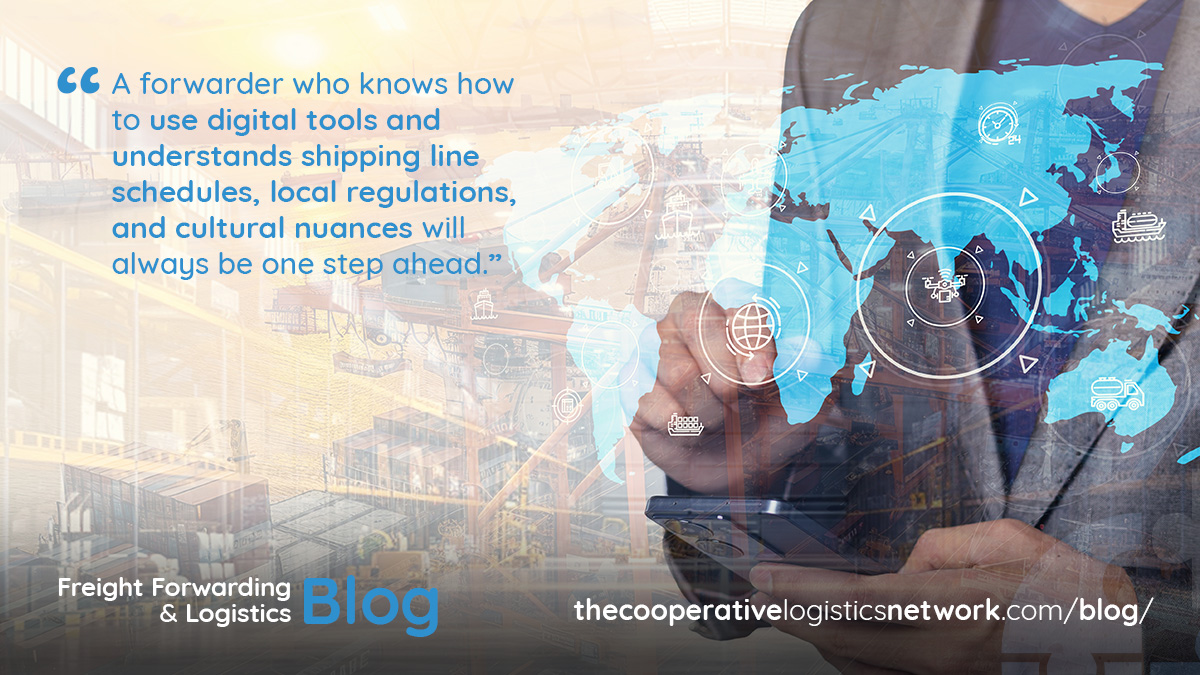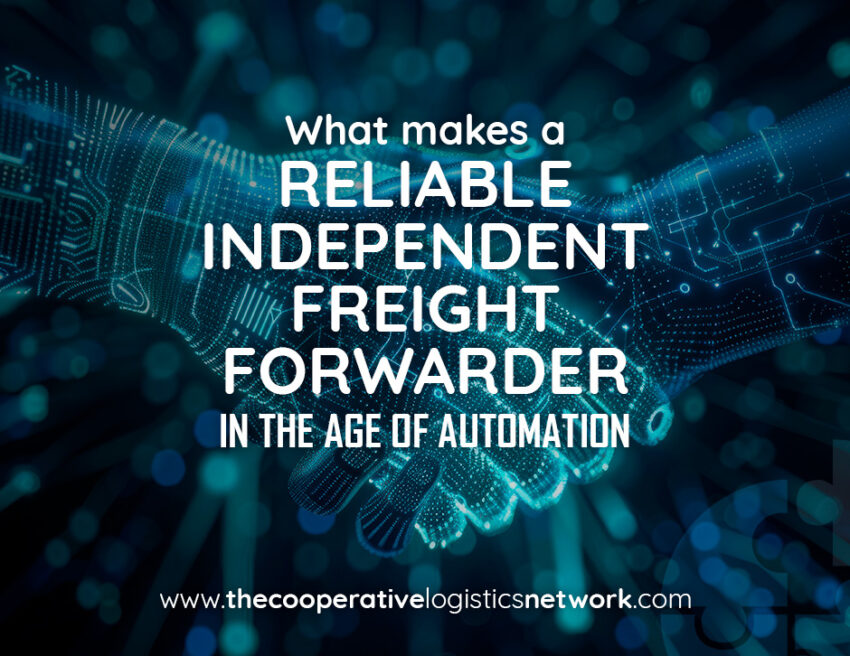Freight forwarding isn’t what it used to be. Not long ago, the strength of a forwarder was measured in phone calls, personal relationships, and the ability to juggle documents, customs rules, and client expectations across time zones. Today, the industry is changing fast. Automated quoting platforms, AI-powered route optimization, paperless customs clearance, and real-time cargo tracking tools are becoming the new standard.
In this age of automation, it’s natural to wonder: What makes a good freight forwarder now? Is it someone with the latest digital tools or someone with hands-on experience and local know-how? The truth is, being a reliable independent freight forwarder today means combining the best of both worlds: embracing technology while staying rooted in the human strengths that machines still can’t replicate like trust, flexibility, and deep industry understanding.

The core strengths of a reliable independent freight forwarder
Being a freight forwarder isn’t just about moving goods. It’s about solving problems. And no amount of automation can replace the instincts, experience, and relationships that seasoned professionals bring to the table. Here’s what sets the best apart:
1. Strong global partnerships
A good independent freight forwarder has a trusted network of partners across the world. Whether it’s clearing customs in Hamburg, arranging a last-mile truck in Dhaka, or coordinating a transshipment in Singapore, forwarders need local experts they can rely on.
This is where logistics networks like The Cooperative Logistics Network (The Coop) make a big difference. By connecting vetted, reliable freight forwarders across 130+ cities, The Coop gives members access to trustworthy partners, allowing them to handle shipments in parts of the world where they might not have a local office.
2. Deep industry knowledge
AI tools can give rate comparisons and route suggestions, but they don’t understand things like weather-related port closures, dockworker strikes, or cultural differences in business communication. A good freight forwarder knows how to anticipate such issues and plan accordingly.
Understanding Incoterms, container types, dangerous goods handling, HS codes, and insurance requirements remains essential, no matter how smart the software becomes.
3. Crisis management skills
Delays happen. Shipments get rolled. Customs officers request surprise documentation. That’s when the human side of freight forwarding shines. Good forwarders stay calm under pressure, communicate clearly with clients and partners, and find practical workarounds when systems break down.
Automation can support this, but it can’t replace the quick thinking that experienced professionals bring when things go wrong.
How automation is changing the role of forwarders
Automation is not the enemy. In fact, it’s helping forwarders save time, reduce errors, and provide better service. Here’s how the best independent freight forwarders are adapting:
Faster quoting and booking
With rate management tools and digital quoting platforms, freight forwarders can now respond to inquiries within minutes. Platforms like FreightViewer—The Coop’s exclusive digital tool—allow members to generate instant quotes, compare carrier rates, and share offers with clients, all from one interface.
Real-Time visibility
Customers today expect to know exactly where their cargo is and when it will arrive. Smart forwarders use automated tracking systems to share real-time updates with clients, reducing the number of emails and phone calls while increasing transparency.
Paperless documentation
Customs procedures are going digital. E-invoicing, electronic bills of lading (eBL), and blockchain-based documentation are becoming more common. Staying up to date with these tools helps forwarders reduce delays and improve accuracy.
Workflow automation
Tasks like sending shipping notifications, generating documents, or creating invoices can be automated, freeing up time for forwarders to focus on customer service and problem-solving.
Why human expertise still matters
Even with all these tech tools, freight forwarding remains a relationship-driven business. Clients still want to talk to someone they trust. When a cargo delay threatens to impact a production line or when sensitive goods like perishables or pharmaceuticals are involved, clients don’t want a chatbot—they want a person.
Here’s why human expertise still plays a key role:
-
Understanding customer needs: No software can understand a client’s tone of voice or adapt to their unique preferences like a human can.
-
Handling exceptions: Logistics is full of unpredictable situations. Flexibility, negotiation, and creativity are still critical skills.
-
Building loyalty: Personal relationships lead to long-term partnerships. Automation supports the service—but it’s the human connection that keeps customers coming back.
How The Cooperative Logistics Network supports the modern independent freight forwarder
The Cooperative Logistics Network understands the challenges faced by freight forwarders in today’s digital and competitive landscape. That’s why it offers a powerful mix of technology, education, protection, and global connections to help members succeed:
A trusted network of over 370 vetted logistics partners: Each member is carefully selected and audited, ensuring you work only with reliable freight forwarders across more than 130 countries.
Access to FreightViewer: The Cooperative Logistics Network’s exclusive digital freight quoting software allows members to create instant quotes, compare carrier rates, and manage quotes more efficiently, bringing digital transformation within reach of independent companies.
Promotion through news and social media: Member achievements are highlighted in The Coop’s News section, newsletters, and social media channels, helping raise visibility and credibility in the industry.
Freight forwarding courses by CIFFA: Members can access professional training through The Coop’s partnership with CIFFA (Canadian International Freight Forwarders Association), gaining certifications and sharpening their logistics skills.
Annual Meetings for face-to-face business development: These events give members the chance to connect in person, build trust, and explore new business opportunities with fellow forwarders from around the world.
Optional Payment Protection Plan (PPP): This financial safeguard provides peace of mind when working with other members, helping minimize the risk of unpaid invoices.
In a time when freight forwarding is becoming more digitized, The Coop helps forwarders stay competitive without losing the personal touch that makes them valuable.
Becoming a “reliable” forwarder today: A balanced skillset
Success in modern freight forwarding doesn’t come from choosing between tech and people—it comes from blending both. A forwarder who knows how to use digital tools and understands shipping line schedules, local regulations, and cultural nuances will always be one step ahead.
Here are a few tips for forwarders who want to stay relevant:
-
Invest in training: Keep learning about new technologies, customs changes, and compliance standards.
-
Use automation to enhance, not replace, your personal service.
-
Join a strong logistics network to expand your global reach without losing your independence.
-
Focus on relationships with clients, carriers, and agents. People still choose to work with those they trust.
Conclusion: The human touch still wins
Technology is changing freight forwarding—but it’s not replacing it. The best independent freight forwarders are not just embracing automation, they’re using it to become even more valuable to their clients.
At the end of the day, freight forwarding is still about people helping people move goods across the globe—efficiently, safely, and with care. And that’s something no machine can truly automate.
For independent forwarders looking to grow, stay competitive, and offer more value in this fast-changing landscape, being part of a reliable network like The Cooperative Logistics Network can make all the difference.


